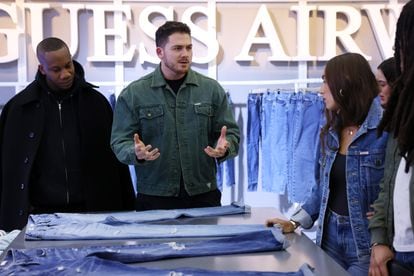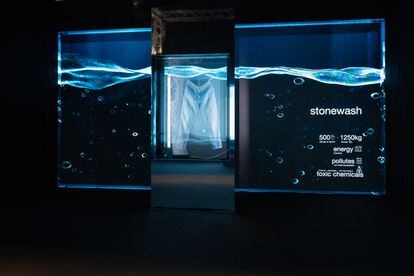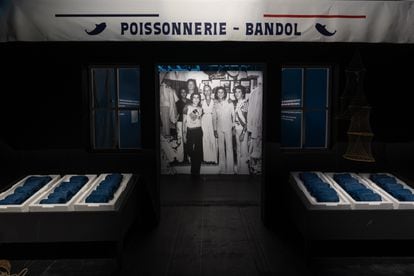Nicolai Marciano was born in the mid-nineties of the last century, when Guess, the brand founded in Los Angeles by his father and uncle, was experiencing its golden age in the United States thanks to the sale of jeans and casual clothing and entered the European market. Last Tuesday, in Florence, within the framework of Pitti Uomo – the 105th edition of the most important fair in the men's fashion sector – the young executive served as host of a powerful exhibition at the Teatro del Maggio Fiorentino that shows his most ambitious project to date: the relaunch of Guess Jeans, the house's jeans line, in a sustainable way. “It is one thing to create a new brand, and quite another to rewrite the DNA of a firm with 42 years of history, which is present in 100 countries and has 1,500 stores,” he explains during the conversation with EL PAÍS. “It has been a challenge, but I have been studying the brand for almost 10 years and we have arrived at the right time,” says the current creative director of Guess Jeans.
The key to this launch is the garment that gives it its name: jeans. They were the key to the brand's takeoff in 1981, when the Marciano brothers, of French origin, launched their first models, which incorporated zippers at the ankles to show off a more fitted silhouette. An empire was born, and shortly after they introduced to the market a variation that until then was an artisanal rarity: stonewashed pants. To obtain it, each garment was placed in laundry machines that, based on friction and hours of washing with pumice stones and chemicals, wore down the rigid cotton canvas and made it easier to wear. It was a very expensive process, especially because of its cost to the environment.
Hence the relevance of Marciano's new project, which recovers this aspect through a technology patented by the Spanish company Jeanologia, and of which Guess has the exclusive control for the next few years. This new process saves up to 80% of the water used in traditional washes through a method called Guess Airwash that uses small air bubbles to carry out the wear, and laser systems to achieve the different shades and wear of the jeans.
“We have the capacity and responsibility to work sustainably. I do not believe in sustainability as a tool of marketing, but as reality. It wouldn't make sense to make just a few jeans with Guess Airwash, because we want a real impact,” says Marciano. This is how he explains the scope of this innovation: “It is a digital technology, it is not analog, so any factory that wants to use it must have this type of equipment. But I think the logical thing is that this Guess Airwash movement will have a domino effect and become a trend throughout the sector. We believe this should be the new way of producing denim around the world. “Forty years ago Guess led the process and innovation of stonewashing, and four decades later we are returning to the market with something that, we believe, closes the circle for the future.”

Beyond jeans, available in various cuts and finishes, the new line proposes a wardrobe inspired by relaxed American classics, with knitwear that aspires to conquer the male audience. Nicolai Marciano, also in charge of new business development at Guess, has grown up in the heart of the brand founded by his family. Today he is 27 years old, but he started working for the company as an intern at 17, when he had barely finished high school, and he trained in different departments of the company before focusing on jeans. In theory he knows the company better than anyone, but he confesses to having been surprised when he dug into his archives and discovered that, before being a global fashion company with a primarily female clientele, Guess had been a casual clothing phenomenon with American roots, a brand that had dressed several generations of young people. “We started as a brand of denim of California, and today I would say that we are perceived more as a European firm of lifestyle“, analyzes the businessman. “What we did in the eighties and nineties is a chapter practically absent in the brand today. For me, and also for Paul [Marciano, su padre, cofundador de la marca] It is not so much a business decision as something personal, not forgetting your roots.”

In fact, that concern was already in the first project led by Nicolai Marciano. In 2016, his collaboration with rapper A$AP Rocky, framed in the Guess Originals line, began this recovery of a few forgotten decades in the house's imagination. “Rocky had grown up in Harlem, surrounded by Guess, and had a very personal relationship with the brand. The young people understood it and were surprised to discover that facet of the brand, that youthful energy, full of fun. It was the first creative project I contributed to the firm and it was a great case study.” In the first Guess Jeans collection, that energy—“American classics are on everyone's inspiration board today,” explains Marciano—is transferred to other garments that recover and reinterpret labels, zippers, details and designs from the files.

That the presentation of the new line took place in Florence is doubly significant. It was in the Tuscan city where Guess began its arrival in Europe in 1993. “For me, it is like my second home. I lived here for a time when I worked in the Italian Guess office when I was 19,” explains the American. “Today, almost 65% of our business is in Europe, so Florence is essential for us. Furthermore, presenting this new line at Pitti Uomo is relevant because it is a fair very focused on the product, and this project is about ideas, innovation, production.”
#Nicolai #Marciano #son #cofounder #Guess #reinvents #jeans #sustainable
